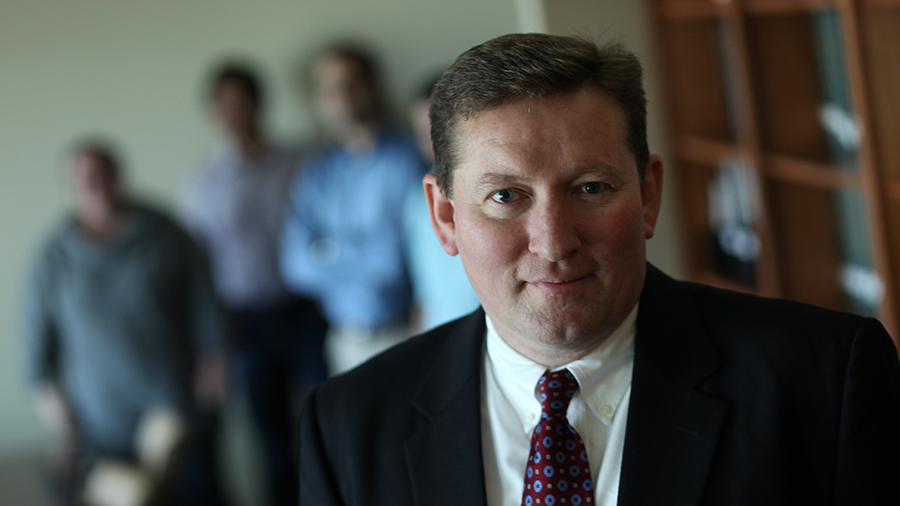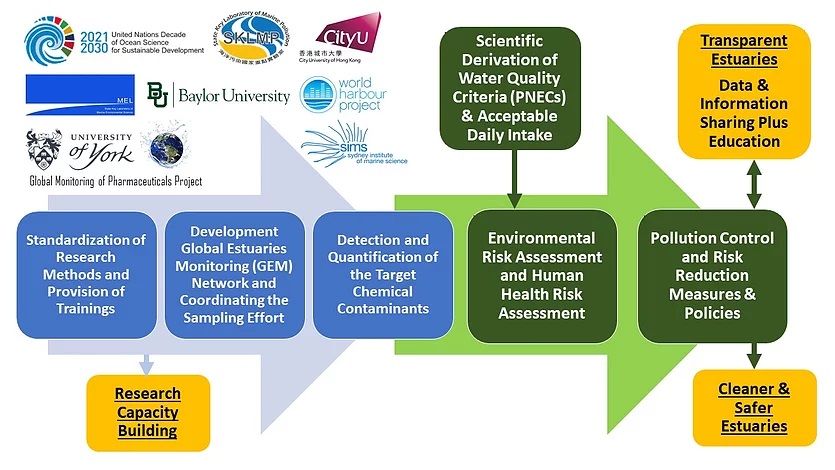Baylor Water Quality Researcher Part of United Nations-endorsed Global Estuary Project
Bryan Brooks, Ph.D., is a partner of the Global Estuaries Monitoring (GEM) Programme to study environmental pollutants in the estuaries of major cities across the globe
Media Contact: Kaitlyn Rieper, Baylor University Media and Public Relations, 254-405-9110Follow us on Twitter: @BaylorUMedia
WACO, Texas (Aug. 18, 2021) – Baylor University’s internationally recognized researcher in water quality, Bryan W. Brooks, Ph.D., is one of the collaborative partners of the Global Estuaries Monitoring (GEM) Programme, which was recently endorsed by the United Nations (UN).
The 10-year GEM Programme – proposed by the State Key Laboratory of Marine Pollution (SKLMP) at City University of Hong Kong (CityU) – will collect and study environmental pollutants, such as pharmaceutical residues, micro-plastics, pathogens and emerging pollutants of concern, in the estuaries of major cities around the world to formulate a long-term policy of promoting clean estuaries.
Brooks is Distinguished Professor of Environmental Science and Biomedical Studies and also serves director of the Environmental Health Science Program at Baylor. Working internationally on issues involving water quality, environmental contaminants and sustainability in rapidly urbanizing regions of the world, Brooks develops science-based approaches to define and manage complex environmental and health issues.
Brooks’ research, and multiple collaborations with other initiatives such as the Global Horizon Scanning Project and the Centers for Disease Control and Prevention’s groundbreaking UNCOVER-EH initiative, bolsters Baylor’s focus on Health, specifically environmental determinants, one of the five signature academic initiatives of Illuminate, Baylor’s strategic plan.
“Billions of people live on coastlines or immediately upstream from them, and this global trend is increasing with demographic transitions to cities and population growth,” Brooks said. “We look forward to working with Professor Leung and our colleagues around the world to engage this timely and necessary initiative, which aligns with Baylor’s unique mission and strategic efforts.”
“As the population grows in coastal areas, global estuaries are facing unprecedented challenges associated with water pollution,” said Kenneth Leung Mei-yee, director of SKLMP and Chair Professor of Environmental Toxicology and Chemistry in the Department of Chemistry at CityU. “CityU will establish a global monitoring network with partners from all over the world to collect samples and conduct experiments to identify pollution hotspots and priority contaminants in order to recommend and promote the best strategies to create cleaner estuaries.”
At present, more than 100,000 chemical substances are being used in daily life and industries, and many of them will eventually be released into estuaries through different pathways. Nevertheless, there is a lack of information available around the globe concerning the occurrence and environmental risks of chemical contaminants in urbanized estuaries, especially those in Africa, South America, and in some coastal areas in Southeast Asia and Oceania.
The GEM Programme, led by Professor Leung, will develop standardized methods to establish a global monitoring network to collect seawater samples from urbanized estuaries worldwide, extract and quantify priority chemical contaminants, analyze and compare the differences of water quality among different estuaries and provide training opportunities to build capacity for pollution monitoring.
The first phase of the study will be launched in May 2022 in major urbanized estuaries in the southern hemisphere, and extended to the northern hemisphere in November of the same year. It is expected that about 100 countries or regions will participate. The research team expects to publish the report after the completion of the first phase in 2023, revealing the pollution status of global estuaries, thus identifying the concerned estuaries and strategies for improvements at an earlier stage.
In addition to Brooks, collaborative partners of the GEM Programme include Professor Alistair Boxall from the University of York, UK, Professor Martina Doblin from the Sydney Institute of Marine Science (SIMS), Australia and Dr. Yuan Shen from the State Key Laboratory of Marine Environmental Science (MEL) in Xiamen University, China.
CityU has allocated HK$4 million to support the research. The team also will solicit support from the World Harbour Project with members from 27 coastal cities, the UNESCO Intergovernmental Oceanographic Commission Sub-Commission for the Western Pacific (IOC/WESTPAC), and the Society of Environmental Toxicology and Chemistry (SETAC), and will invite top researchers from all over the world to join and support the initiative.
ABOUT BAYLOR UNIVERSITY
Baylor University is a private Christian University and a nationally ranked research institution. The University provides a vibrant campus community for more than 19,000 students by blending interdisciplinary research with an international reputation for educational excellence and a faculty commitment to teaching and scholarship. Chartered in 1845 by the Republic of Texas through the efforts of Baptist pioneers, Baylor is the oldest continually operating University in Texas. Located in Waco, Baylor welcomes students from all 50 states and more than 90 countries to study a broad range of degrees among its 12 nationally recognized academic divisions.

